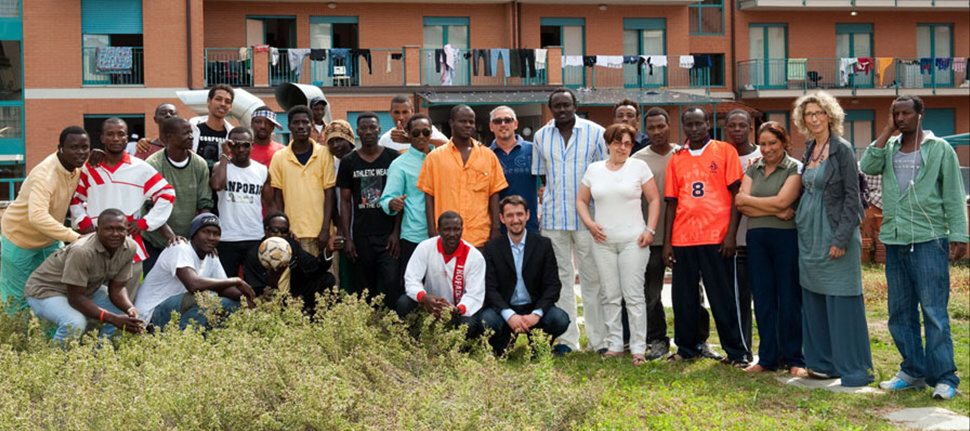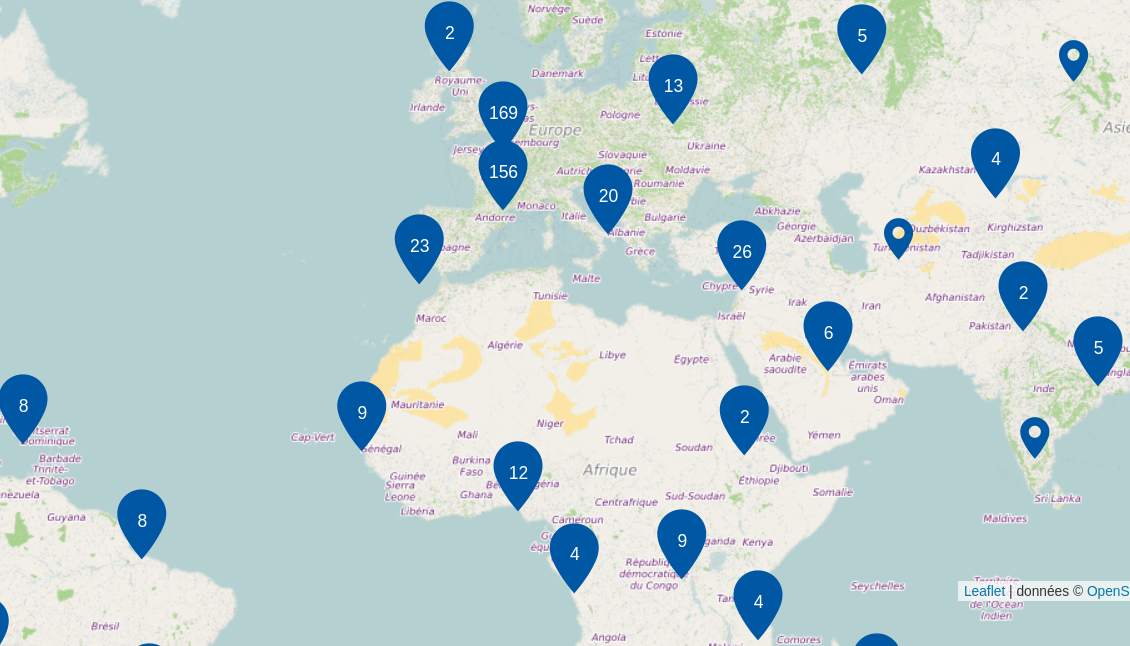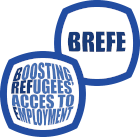Testimonies
Three types of testimonies are presented: stories of refugees, integration paths seen from the professionals' point of view and initiatives told by the people who implement them. They show that a successful professional integration requires the joint involvement of several actors. They can be accessed either directly or by keywords.
L’Isola di Ariel
L’Isola di Ariel is an Italian social cooperative working with disadvantaged people like psychiatric patients and newly migrants, mainly asylum seekers (85% have not received a title of protection, yet and many of them have the appointment with the Refugee Commission in 2020). This being suspended in a sort of limbo generates lot of frustration. Professionals from L’Isola di Ariel manage the whole process from the first reception till the social and work inclusion. Their care methods are strongly influenced by antropological and anti-psychiatric approach. As an example they take the practice of setting the table with patience and care, as a symbol of the relationship with the other, from the long experience done in the social-health field (in an apartments of psychiatric groups the operators carefully prepares the table and waits patiently for the guests sit to share and learn to prepare the table for themselves and others). From the consideration that a laid table facilitates dialogue and relationship, this cooperative considers food as a powerful social mean to promote exchange, contamination among people with different cultures. Food may be also a catalyst for social and work inclusion. Newcomers need to be helped to build their self and this is easier if they are included as soon as possible in a social and working context. Qualifying migrants and asylum seekers in the field of cooking is a way to provide newcomers with self-empowerment and work empowerment. The sooner they are inserted in a working context, e.g. in traineeship or volunteering, the sooner they improve their language and soft skills. Three inns specialized in Mediterranean cuisine (”La Locanda Clandestina” – ”Clandestine Inn”) have been set up in Torino, where multi-cultural teams work and food is a contamination of Mediterranean and ethnic cuisine.
Another similar project carried out in Piemonte is “Food for Inclusion”, which is the result of a partnership between the University of Gastronomic Sciences and UNHCR. Courses are specifically dedicated to refugees and asylum seekers, based on cooking techniques, mixed-race kitchens, and gastronomic traditions from the world.

Volunteering to accelerate integration, in addition to taking advantage of the various opportunities to learn the language
"When I arrived in France with my husband and son, I was pregnant. I only knew a few words of French : "hello, goodbye, thank you, I don't understand". I had studied music in Georgia. I had worked for 11 years as a teacher in music school and in primary school for singing lessons. As soon as I arrived in France, I wanted to take courses to speak French. It started at the Restos du cœur and then, when we went to the centre for asylum seekers, I took another course.
As my son went to school, I looked at his homework and I also learned like that by following his school work. I also watched a lot of French TV. When we went to the French Administration for Immigration and Integration to sign the contract of reception and integration, we were sent to the Greta to take French courses.
I did the mandatory training and passed the Diploma of French Language Studies (DELF) Level A1. I continued with the DELF Level A2 again thanks to the Administration for Immigration. Then I followed a 600-hour training course with the job centre. It really helped me a lot.
Learning the language has opened up doors for me. I was able to talk, to explain what I needed. Knowing French has helped me a lot. I could express myself, say what I think. Here people think freely, you shouldn't be afraid to talk. We must not be discouraged because sometimes it is difficult. Getting out of the house, being in contact with others and not staying with the people of your country. Being in contact with the social worker of the centre for asylum seekers was also important. I had always been very active and I really wanted to work. I wanted to continue to work in the field of music as a teacher. I had to find something to do, even on a voluntary basis. After the birth of my second son, I volunteered at the nursery but also in the church for music festivals. I play an instrument from my country. Thanks to the crèche I was spotted by a staff member from the municipality to participate in the baby shower and play music. I also play for neighbourhood parties, and with the symphony orchestra of the music conservatory. I sing in a choir as a soloist. One day I was offered a replacement at the conservatory as a piano teacher, then music theory lessons in the surrounding cities, as well as musical initiation too. Since then I've even been doing replacements for the choir, I do a lot of replacements.
In France, there are many social benefits, especially in terms of health. I was well cared for in the maternity hospital for the birth of our second child. Women have more rights here. But I can say that the mentalities are similar to those of my country, they are quite similar. We have the same religious holidays. Besides, I lived in a small town like this one.
My son has adapted very well.
Last year I followed a training course financed by the Immigration Bureau to validate a B1 level and I was able to apply for naturalisation. I am very happy to be here.”

A successful integration thanks to an intrinsic determination supported by the parish community
Yunan was 25 years old when he arrived in France in 2017 with his parents and sister. They fled Iraq because of the war. They joined the province of Haute-Loire to meet members of the Iraqi community native from the Nineveh plain who had been welcomed by a Catholic parish, including his fiancée. The support set up by the parish allows Yunan and his family to be housed in an environment with daily contacts with French people. Supported in their administrative procedures, they also benefit from the network of volunteers for material matters, such as local mobility.
Yunan was granted refugee status a few months later. Very active, he has participated as a volunteer in renovation work. A few months later he found a job as a painter plasterer thanks to the network of volunteers. He therefore requested to postpone the language courses prescribed by the French Office of Immigration and Integration when the reception and integration contract is signed.
Through contact with volunteers and then with his colleagues at work that Yunan has acquired the basics in French and developed oral communication skills in the first instance. On a personal level, Yunan married someone from the Iraqi community living in Le Puy. A few months later, aware of the importance of mastering French in writing, Yunan contacted the Greta to enrol in the mandatory language course prescribed by the French Office of Immigration, even-though he had already reached the A1 level in oral communication targeted by this prescription. The training has been therefore mainly oriented towards the development of written skills so that Mr H. could claim new responsibilities within the company in which he was employed. Indeed, even if the higher education he has followed in Iraq is not in the construction sector, he has been trained in team management and his employer wanted to give him a position as team leader.
Yunan says he wants to pursue in the host country the same objectives he had in his home country, namely to take up a position of responsibility, to start a family and to build a house. For him, the key to achieving these objectives is the willingness he deploys, particularly in his work, as well as the desire to participate in the "life of the city". He wishes to apply for French nationality and has enrolled in the language test to validate a B1 level in French in order to submit his naturalisation application file.

